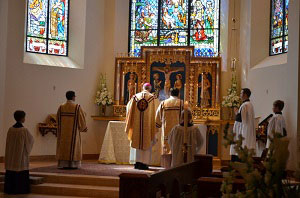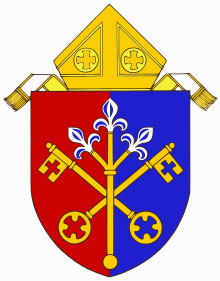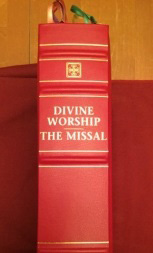Roman Catholic:
Anglican Ordinariate
by Gary D. Penkala
I. Anglican Ordinariates
 Since the Aposostolic Constitution Anglicanorum coetibus, issued in November 2009 by Pope Benedict XVI, three Personal Ordinariates have been established for those Anglicans who wish to unite with the Roman Catholic Church, maintaining some of their liturgical patrimony.
The Personal Ordinariate of Our Lady of Walsingham was established in January 2011 for England and Wales.
In June 2012, the Personal Ordinariate of Our Lady of the Southern Cross was established for Australia and Asia.
The Personal Ordinariate of the Chair of Saint Peter, for the United States and Canada, was established in January 2012.
A Personal Ordinariate is similar to a diocese, but of broader geographical scope, with the Ordinary (most often a bishop) directly subject to the pope.
Since the Aposostolic Constitution Anglicanorum coetibus, issued in November 2009 by Pope Benedict XVI, three Personal Ordinariates have been established for those Anglicans who wish to unite with the Roman Catholic Church, maintaining some of their liturgical patrimony.
The Personal Ordinariate of Our Lady of Walsingham was established in January 2011 for England and Wales.
In June 2012, the Personal Ordinariate of Our Lady of the Southern Cross was established for Australia and Asia.
The Personal Ordinariate of the Chair of Saint Peter, for the United States and Canada, was established in January 2012.
A Personal Ordinariate is similar to a diocese, but of broader geographical scope, with the Ordinary (most often a bishop) directly subject to the pope.
II. Personal Ordinariate of the Chair of Saint Peter
 Msgr. Jeffrey N. Steenson, a married Anglican bishop who converted to Catholicism and was ordained a Catholic priest, was the first Ordinary in 2012.
He was succeeded in early 2016 by Bishop Steven J. Lopes, the Ordinariate's first bishop.
The cathedral is located in Houston TX: the Cathedral of Our Lady of Walsingham, with Fr. Charles Hough IV as its rector.
Forty-three parishes make up the ordinariate, which has a bishop, an ordinary-emeritus, 62 priests, 6 deacons, and 5 candidates for ordination.
From the ordinariate website:
Msgr. Jeffrey N. Steenson, a married Anglican bishop who converted to Catholicism and was ordained a Catholic priest, was the first Ordinary in 2012.
He was succeeded in early 2016 by Bishop Steven J. Lopes, the Ordinariate's first bishop.
The cathedral is located in Houston TX: the Cathedral of Our Lady of Walsingham, with Fr. Charles Hough IV as its rector.
Forty-three parishes make up the ordinariate, which has a bishop, an ordinary-emeritus, 62 priests, 6 deacons, and 5 candidates for ordination.
From the ordinariate website:
The establishment of the Personal Ordinariate of the Chair of Saint Peter was the Vatican's pastoral response to repeated and persistent inquiries made by Anglican individuals and groups in the United States and Canada who, over time, have come to identify the Catholic Church as their home.
Those joining the Ordinariate have discerned they are truly Catholic in what they believe and desire full membership in the Catholic Church.
The mission of the Ordinariate is particularly experienced in the reverence and beauty of our worship, which features Anglican traditions of worship while conforming to Catholic doctrinal, sacramental and liturgical standards.
Through Divine Worship: The Missal — the liturgy that unites the Ordinariates throughout the English-speaking world — we share our distinctive commitment to
praising God in the eloquence of the Anglican liturgical patrimony and Prayer Book English.
III. Ordinariate Parishes
Ten parishes can be found in Canada: four in Ontario (Ottawa, Kitchner, Oshawa, Toronto), two in British Columbia (Victoria, Maple Ridge), two in Alberta (Calgary, Edmonton), and one each in New Brunswick (Fredericton) and Nova Scotia (Halifax).
In the United States, Texas has the most ordinariate parishes at eight: Houston, Corpus Christi, Boerne, Cleburne, Katy, Arlington, Denison and Fort Worth.
Florida has four: two in Orlando, one each in Pinecrest and Saint Augustine.
There are three parishes in Maryland: Baltimore, Towson and Catonsville.
California (Irvine, Carlsbad), Missouri (Kansas City, Republic), Pennsylvania (Scranton, Bridgeport), and South Carolina (Charleston, Greenville) each have two parishes.
Nine more states and a district have one parish each: Washington DC, New York (Rochester), Alabama (Mobile), Minnesota (Saint Louis Park), Georgia (Savannah), Nebraska (Omaha), Indiana (Indianapolis), Massachusetts (Stoneham), North Carolina (Jacksonville) and Arizona (Payson).
IV. Ordinariate Liturgy —
Divine Worship: The Missal
 Published in 2016, Divine Worship: The Missal contains the liturgical texts for ordinariate use.
Elements of traditional Anglican liturgy [dating back to Cramner], the Tridentine Mass, and the Novus Ordo Roman Missal (2010) can be found in the newly-composed Order of Mass for worship throughout the three Personal Ordinariates (U.S/Canada, Great Britain, Australia/Asia).
"Prayer Book English" is used in the volume, meaning it does not shy away from elevated church language, e.g. "Thee" and "Thou" abound.
Published in 2016, Divine Worship: The Missal contains the liturgical texts for ordinariate use.
Elements of traditional Anglican liturgy [dating back to Cramner], the Tridentine Mass, and the Novus Ordo Roman Missal (2010) can be found in the newly-composed Order of Mass for worship throughout the three Personal Ordinariates (U.S/Canada, Great Britain, Australia/Asia).
"Prayer Book English" is used in the volume, meaning it does not shy away from elevated church language, e.g. "Thee" and "Thou" abound.
Collect for the Eighth Sunday after Trinity --
O God, whose never-failing providence ordereth all
things both in heaven and earth:
we humbly beseech thee to put away from us
all hurtful things,
and to give us those things which be profitable for us;
through Jesus Christ thy Son our Lord,
who liveth and reigneth with thee,
in the unity of the Holy Spirit,
ever one God, world without end
The structure of the Mass shows influences from Anglicanism, the Traditional Latin Mass and the Roman Missal.
Introductory Rites
- Option I
- Introit/Hymn
- Collect for Purity
- Summary of the Law / Decalogue (omitting Kyrie below)
- Option II
- Prayers at the Foot of the Altar
- Option III
- Kyrie (6-fold)
- Gloria
- Salutation
- Collect
Liturgy of the Word — Year A, B, C [Revised Standard Version – 2nd Catholic Edition]
- Lesson
- Gradual / Responsorial Psalm
- Epistle
- Alleluia or Tract / Gospel Acclamation
- Gospel
- Homily
- Creed (Profession of Faith)
- Prayers of the People
Penitential Rite
- Invitation to Confession
- Comfortable Words
Liturgy of the Eucharist
- Offertory Prayers [BCP or Roman Missal]
- Offertory Antiphon/Hymn
- Prayer over the Offerings
- Preface Dialogue
- Preface
- Sanctus/Benedictus
- Canon [Roman Canon or Eucharistic Prayer II]
- Memorial Acclamation
- Amen
- Lord's Prayer
- Rite of Peace
- Verse: Christ Our Passover
- Agnus Dei
- Prayer of Humble Access ("We do not presume to come to this thy Table, O merciful Lord")
- Domine non sum dignus (3x)
- Distribution of Communion
- Communion Antiphon/Hymn
- Thanksgiving after Communion ("Almighty and everliving God, we most heartily thank thee")
- Postcommunion Prayer
Concluding Rites
- Blessing
- Dismissal
- Last Gospel (optional)
- Recessional Hymn (optional)
V. Ordinariate Liturgical Calendar
The Ordo, or the Liturgical Calendar for the U.S. ordinariate is interesting in its combination of elements of the calendars of both the Ordinary Form and the Extraordinary Form of the Mass.
From the Ordinary Form:
- the hierarchy of celebrations: solemnity, feast, obligatory memorial, optional memorial, feria
- the four Masses of Christmas: Vigil, Night, Dawn, Day
- Holy Family on the Sunday after Christmas
- distinct Vigil Mass for Epiphany, Ascension, Pentecost, Nativity of Saint John the Baptist, Peter & Paul, Assumption
- Baptism of the Lord on Sunday after Epiphany
- Easter Vigil with seven Old Testament readings & Pentecost Vigil with four Old Testament readings
- Divine Mercy Sunday on Easter II
- Paschal Candle removed after Pentecost
- Christ the King on the last Sunday of the Liturgical Year
From the Extraordinary Form:
- the quarterly Ember Days
- no "Ordinary Time" — rather, Sundays after Epiphany and Sundays after Trinity
- Pre-Lent: Septuaqesima, Sexagesima, Quinquagesiam
- Passiontide [Fifth Sunday of Lent through Triduum]
- sequences (Easter, Pentecost, Corpus Christi) are sung after the Alleluia
- preference for Epiphany, Ascension and Corpus Christi on proper days [not transferred to Sundays]
- three Rogation Days prior to Ascension
- Octave of Pentecost, with red vestments
- black/violet preference for Requiem Masses, Memorial Day, All Souls Day
- The Doxology ("Glory be to the Father …") is omitted during Passiontide
There are some other interesting aspects of this calendar.
The last seven days of Advent are subtitled for their O Antiphon: O Sapientia, O Adonai, O Radix Jesse, etc.
The Christmas Proclamation is slated for before Midnight Mass and the Epiphany announcment of the moveable feasts for the upcoming year occurs after the Gospel on January 6.
The Great Litany may open the Mass on Advent I and Lent I.
The practice of covering the cross and statues from Lent V (Passion Sunday) through the Triduum is maintained.
Article written 19 July 2016
|


